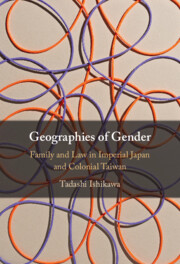Book contents
- Geographies of Gender
- Geographies of Gender
- Copyright page
- Dedication
- Contents
- Figures and Maps
- Acknowledgments
- Note on the Text
- Abbreviations
- Introduction
- 1 The Woman Question and Interwar Japan’s International Engagements
- 2 Empire Apart, Empire Together
- 3 Becoming a Taiwanese Man
- 4 When the Hearth Was at Once Warm and Cold
- 5 Freedom in a State of Flux
- 6 Stories Marginal Women Wove
- Conclusion
- Bibliography
- Index
1 - The Woman Question and Interwar Japan’s International Engagements
Published online by Cambridge University Press: 09 January 2025
- Geographies of Gender
- Geographies of Gender
- Copyright page
- Dedication
- Contents
- Figures and Maps
- Acknowledgments
- Note on the Text
- Abbreviations
- Introduction
- 1 The Woman Question and Interwar Japan’s International Engagements
- 2 Empire Apart, Empire Together
- 3 Becoming a Taiwanese Man
- 4 When the Hearth Was at Once Warm and Cold
- 5 Freedom in a State of Flux
- 6 Stories Marginal Women Wove
- Conclusion
- Bibliography
- Index
Summary
This chapter examines how women within the boundaries of the family and marriage became central to interwar Japan’s international relations. Scholars have argued that Japan’s politics, economy, and society shifted from liberalism and internationalism in the 1910s–1920s to conservatism and isolationism in the 1930s. While women’s history has been studied along the same lines, this chapter explores the continued reinterpretations of emerging ideals about gender, emphasizing the continuity and discontinuity of Japan’s modernity spanning those two decades. At the heart of those ideals were informal marital relationships – socialist and companionate marriages – introduced from Soviet Russia and the United States, and global concerns in the League of Nations about human trafficking involving prostitution and daughter adoption. Japanese intellectuals, social leaders, and diplomats continued to engage with reformist ideals to address women’s inequalities in marriage and the family. However, their appeals to progress redefined Japanese women in the preexisting family system and considered them to be promiscuous, reinforcing gendered burdens and sexual differences within Japan’s national contexts.
Keywords
- Type
- Chapter
- Information
- Geographies of GenderFamily and Law in Imperial Japan and Colonial Taiwan, pp. 37 - 76Publisher: Cambridge University PressPrint publication year: 2025

